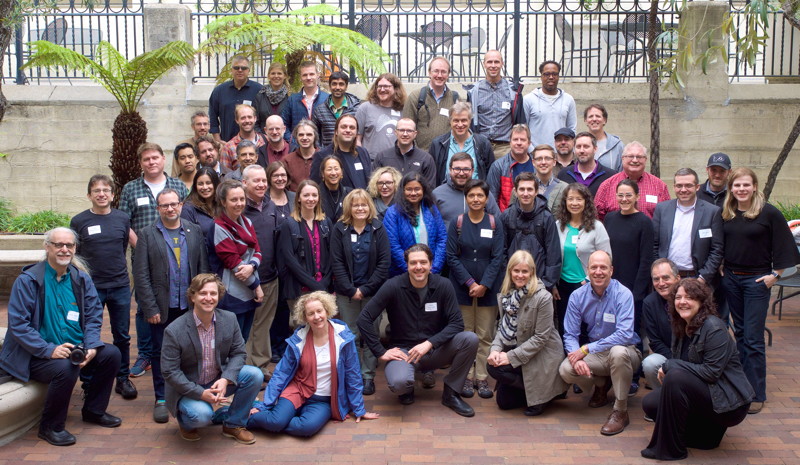
First URSSI workshop attendees (Credit: Mike Hucka)
Contributed by Daniel S. Katz, Jeff Carver, Sandra Gesing, Karthik Ram, Nic Weber
The NSF-funded conceptualization of a US Research Software Sustainability Institute (URSSI) is making the case for and planning a possible institute to improve science and engineering research by supporting the development and sustainability of research software in the US.
Research software is essential to progress in the sciences, engineering, humanities, and all other fields. In many fields, research software is produced within academia, by academics who range in experience and status from students and postdocs to staff members and faculty. Although much research software is developed in academia, important components are also developed in national laboratories and industry. Wherever research software is created and maintained, it can be open source (most likely in academia and national laboratories) or commercial/closed source (most likely in industry, although industry also produces and contributes to open source.)
The open source movement has created a tremendous variety of software, including software used for research and software produced in academia. This plethora of solutions is not easy for researchers to find and use out-of-the-box. Standards and a platform for categorizing software for communities are lacking, which often leads to novel developments rather than reuse of solutions. Three primary classes of concern are pervasive across research software in all research disciplines and have stymied research software from achieving maximum impact:
- Functioning of the individual and team: issues such as training and education, ensuring appropriate credit for software development, enabling publication pathways for research software including novel methods beyond “classical” academic publications, fostering satisfactory and rewarding career paths for people who develop and maintain software, increasing the participation of underrepresented groups in software engineering, and creating and sustaining pipelines of diverse developers.
- Functioning of the research software: supporting sustainability of the software; growing community, evolving governance, and developing relationships between organizations, both academic and industrial; fostering both testing and reproducibility, supporting new models and developments (for example, agile web frameworks, software as a service), and supporting contributions of transient contributors (for example, students).
- Functioning of the research field itself: growing communities around research software and disparate user requirements, avoiding siloed developments, cataloging extant and necessary software, disseminating new developments, and training researchers in the usage of software.
The goal of this conceptualization project is to create a roadmap for a URSSI to minimize or at least decrease these types of concerns. To do this, the two aims of the URSSI conceptualization are to:
- Bring the research software community together to determine how to address the issues about which we have already learned. In some cases, there are already subcommunities working together on a specific problem, including those that we are part of, but those subcommunities might not be working with the larger community. This leads to a risk of developing solutions that solve one issue but don’t reduce (or might even deepen) other concerns.
- Identify additional issues URSSI should address, identify communities for whom these issues are relevant, determine how we should address the issues in coordination with the communities, and determine how to prioritize all the issues in URSSI.
We are not working in a vacuum, but with other like-minded projects. In addition to Better Scientific Software (BSSw) and activities around research facilitators (ACI-REF) in the US, there are two ongoing institutes in science gateways (SGCI) and molecular sciences (MolSSI); a recently completed conceptualization in high energy physics (S2I2-HEP); two other conceptualization projects now underway in geospatial software and fluid dynamics; and a large number of software development and maintenance projects. In the UK, the Software Sustainability Institute (SSI), which has been in operation since 2010, is an inspiration and a potential model for our work.
Given these existing activities, part of our challenge is to define how we will work with these other groups. For example, we might decide that they perform an activity so well that we should point to it, such as the SSI’s software guides. Or we might decide to either duplicate or enhance an activity they do to expand its impact, such as working with the SGCI to offer incubator services to a wider community than just gateway developers. Or we might decide to collaborate with one or more groups, such as on policy campaigns aimed at providing better career paths for research software developers in universities.
We have held one workshop and are planning three more, in addition to a community survey we plan to have out soon, and a set of ethnographic studies of specific projects. We are communicating through our website, a series of newsletters, and a community discussion site.
URSSI welcomes members of the research software community to join us, both to help us determine how to proceed and to directly contribute. Please sign up for the URSSI mailing list, contribute to our discussions, and potentially publish a guest blog post on the URSSI blog on a topic around software sustainability.
